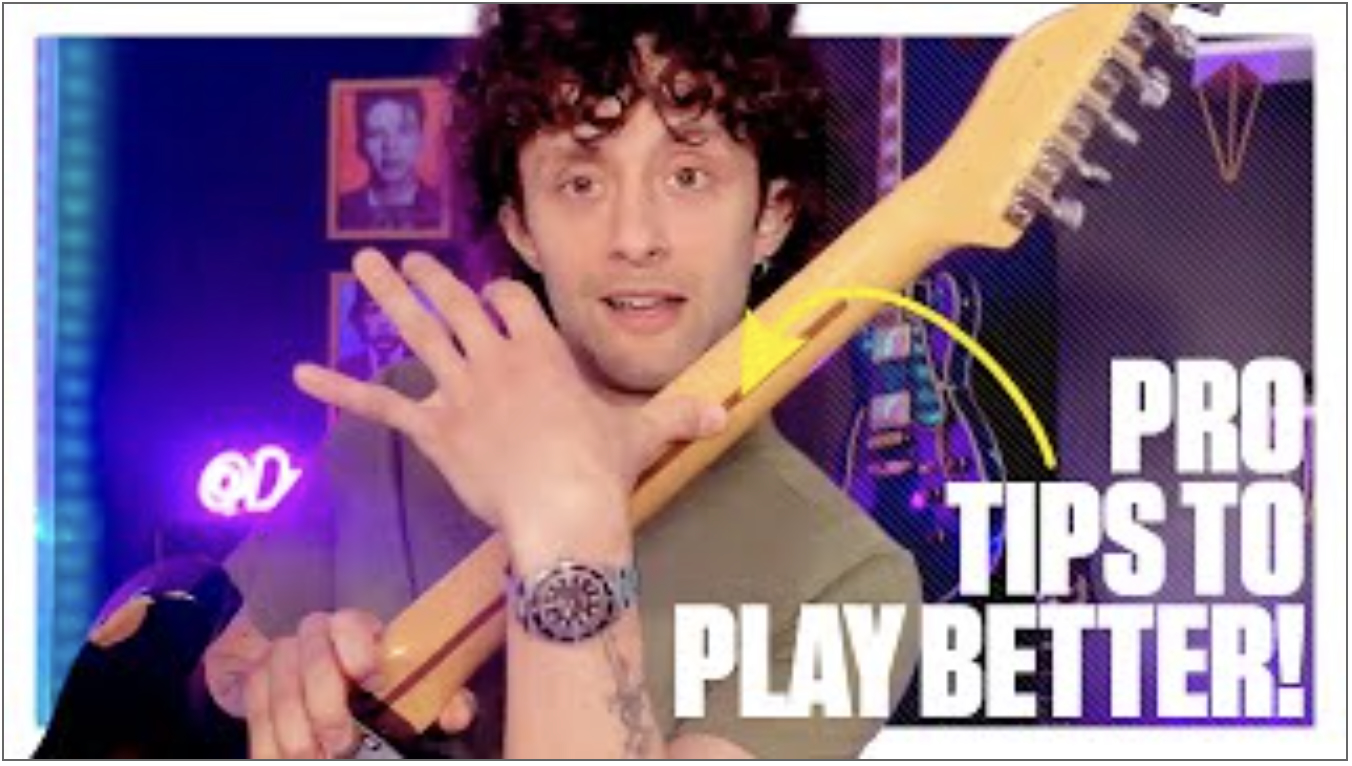Faye Webster: "When I first got a guitar that really felt like it was a part of me, that's when I started to realize I was the player I wanted to be"
Ahead of the release of new album I Know I'm Funny haha, the 23-year-old singer-songwriter discusses finding the guitar that fits, her affinity for pedal steel and why she's never owned a pedal other than her tuner
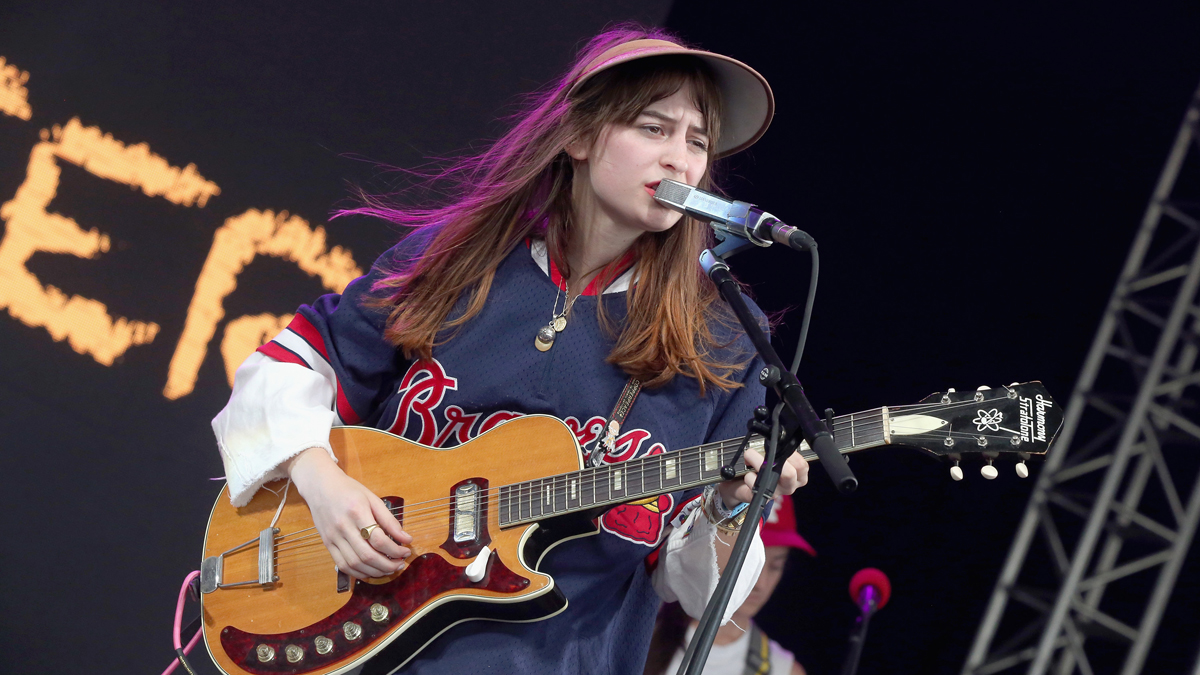
Faye Webster is often driven by her changing obsessions. The singer-songwriter has a reputation as a musician, a photographer (shooting for Killer Mike, among many others) and a yo-yo master. Over lockdown, it was games – anything from chess to consoles. When she gets into something, she’s fixated until she feels like she’s completed it. Music, however – with all its meandering, surprising and undefinable progression – seems to have been the constant.
Raised on an early years diet of bluegrass and Western swing, Webster has since taken in a world of influences, from Atlantan hip-hop, R&B and soul, to indie and country. She recorded her self-titled debut aged 16, released the follow-up Atlanta Millionaires Club in 2019 and now is prepping for the arrival of her third record, I Know I’m Funny haha.
For all of Webster’s flitting interests, listen to her albums and you hear a musician who blends all these seemingly disparate parts into a remarkably calm and clear aesthetic. I Know I’m Funny haha marks a refinement of Webster’s songwriting, hitting a confident stride that documents her relatable internal monologue amid languid, slide-laden tracks. If you’re looking for an album that will soundtrack a summer of lying in your yard on a sun lounger, this could be it.
It even – as found on the chugging track, Cheers – sees Webster veer into a sort of stoned distortion for the first time. Once again, the sense is that you’re listening to something that should not work, but somehow does, and does so beautifully.
We spoke to Webster to find out more about her approach, from her battered-but-beloved Harmony guitar, to the “fuck it” philosophy that has become increasingly central to her writing.
The guitar has been in your family for a long time. What’s your first memory of the instrument?
"I remember hearing it through the walls of my house when my brother played it. I think that's my earliest memory, in the sense of being like, ‘Whoa, hold on…’ Growing up, I don't really remember most shows that I was brought to, but I do remember my parents would take me to Asleep at the Wheel concerts, which is this like old Western swing band that they were obsessed with, because my mom's also from Texas.
Get The Pick Newsletter
All the latest guitar news, interviews, lessons, reviews, deals and more, direct to your inbox!
"I remember the pedal steel player from that – I literally don't remember seeing any other instruments except for his – but he had a pickguard on his guitar in the shape of Texas. That was, like, my first live music experience, outside of my brother playing in our house.
"My grandfather was a bluegrass lover and player. He had all these groups that he would play with, so he was the first person that I really personally knew that was able to play the guitar so well."
Given your grandfather’s bluegrass interests, you were presumably encountering a lot of great players at a young age. What was that like?
I found myself always trying to learn from other people. I was trying to be around people who did it better than me. That is how I felt I learned best
"After a while, I kind of just got used to being the youngest person in the room, in the sense of having the least experience. I found myself always just trying to learn from other people. Not just the guitar, but anything to do with music. Definitely, as a kid, I was just trying to be around people who did it better than me. That is how I felt I learned best."
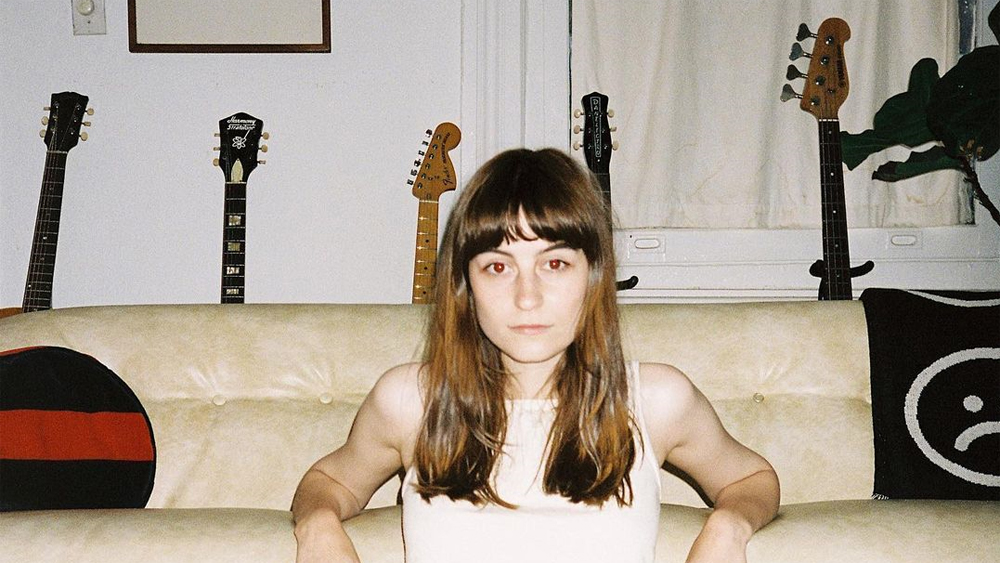
That's something that is true of most people, but despite the benefits, we’re often not comfortable in purposefully putting ourselves in positions where we feel we’re the least capable. What do you think gave you the courage to do that?
"I don't know! At first it was just friends and then it turned into [other people and], 'I want to be your friend.’ I think it was just, luckily, people being really supportive. I don't feel I was ever in a room where it was like, 'We're better than you, so get out of here.' It was just a very supportive environment that I grew up in.
"I would also cover songs like crazy. Any song I liked, I would figure out how to cover it, and sing it. So, that's definitely how it started. It was by ear, and it was bad! Sometimes I was just making shit up.
"By the time I actually started to take guitar lessons, they were like, 'You play this weird!' To this day, I still put on my capo wrong, like upside down. I still definitely play some chords in a way more difficult way than they could be played."
When did you feel like you became comfortable in your own skin as a player?
"I don't know. Making my first record, when I was 16, I got kicked out the booth a lot when it came to guitar! I couldn't [play tight enough], and to me, I was like, 'Dude, it sounds great! What do you mean?' But really, yeah, I probably couldn't keep in time.
When I got a guitar that I really felt like was a part of me, that's when I started to realize I was the player I wanted to be
"I don't think it was until later, when I was playing guitar every day and not thinking about practicing, but just getting more comfortable with it. When I first got a guitar that I really felt like was a part of me and fit me perfectly – literally a Harry Potter wand-type beat – I think that's when I started to realize that I was the player that I wanted to be."
What was the first guitar you felt really comfortable with?
"I got a Harmony Stratotone Jupiter. I got it as a Christmas present from someone and I've just kept it. It's probably my favorite. I had never owned an electric guitar before that one, and I feel like it was a really good segue.
"It's not your classic guitar hero electric guitar. It's short-scale, really lightweight and the perfect size, which I really liked because I'm a smaller person. It was also the perfect hybrid to me. As it was somewhat hollow-bodied, I didn't feel like I had to play it differently from my acoustic guitars. I just felt like it gave me a different style. It just feels good."
Matt ‘Pistol’ Stoessel features on the pedal steel on almost all of your recordings and shows. How did you meet?
"We've been playing together for like seven years now. When I was first playing live shows, I remember I just wanted to have a pedal steel player. I grew up listening to old country and Western swing bands, and it's such a pretty instrument to me. When I asked around the five musicians I knew at the time, it was the same answer for everybody: 'Yeah, Pistol. Pistol's your guy.'
"He's a super-talented and rare pedal steel player. There's like this meme of him that gets sent between Athens and Nashville. It’s a picture of him sitting at his pedal steel and it's just like, 'I play it weird.' And it’s so true, because this man has so many different influences.
"He can play this really old country vibe, he can make it a guitar, he can make it this Hawaiian thing... He’s just one of the greats. I lucked out, because I also feel that way about the rest of my band, too, but it was a long, tedious search to find the perfect people with perfect chemistry. "
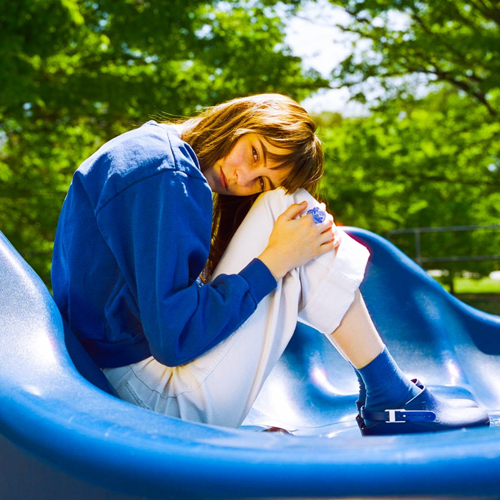
When did you feel like your band line-up was finally established?
"My self-titled album was just me, and then I just built on to it. Like, my keys player was sending stuff in and I would just mash it all up in GarageBand. It was kind of like a Frankenstein-y record, where, piece-by-piece, we were building it randomly with these random people.
"I think after that record came out, and I was just writing what to me were better and more meaningful songs. That's when we started live tracking. AMC [Atlanta Millionaires Club] was definitely full of every member. So, I think it wasn't until we were all together, finally, in the same room, the five of us. I think that's when it was just like, 'Okay, yeah. This is good. We made a good thing.'"
It feels like there are some significant changes on I Know I’m Funny haha. What have you noticed about how you’ve grown as a songwriter since Atlanta Millionaires Club?
At this point I'm just like, 'Fuck it.' I've gotten more comfortable with saying whatever I want to say in songs
"As a songwriter, I feel like at this point I'm just like, 'Fuck it.’ I've definitely gotten more comfortable with just saying whatever the fuck I want to say in songs. On AMC, I was purposely trying to be very honest, and now I think I've done that so much I’ve gotten comfortable with just saying it how it is.
"Now, I feel like I've been writing about stuff that I normally wouldn't write about, if that makes sense? Because I've just been, like, ‘Fuck it. I will sing about this minor detail that does not matter whatsoever.’ So yeah, I think just not caring anymore – in the best way possible.
We all know the advice about being honest or ‘true to yourself’ as songwriters, but we also all habitually self-edit, on social media, in messages, emails… What helped you get to a point where you could actually write in such a direct way?
"I think a big part of it is that, when I do write a song, I just hit a little voice memo on my iPhone, just so I don't forget it, and then I literally do not revisit it until we're all sitting in the studio together. I just think the more you hear it or think about it, that's when you're like, 'Well, this word could have been better there...' Or the more you sing it, especially, you alter the way you sing certain words.
The less you think about a demo the better. That's how you get the most accurate representation of the song
"On this record, I switched out one of the songs for the demo that I had on my phone. There's a lot of background noise and it really was not a good demo, but I was trying to record it and I kept singing it differently. The less you think about it, the better. I feel like that's how you get the most accurate representation of the song."
Cheers feels like a real step into new territory, tonally and playing-wise. Was it always intended to be this chugging, distorted, rumbling thing?
"No, it definitely wasn't. I wrote the song on acoustic guitar. I think, like I was saying, it’s the 'fuck it' mentality. We started playing it and were like, ‘Wait, this feels weird…’ Like, this beautiful, reverb, bass-y harmony, it's calling for [distortion]. I literally only own a tuner pedal, and have only owned a tuner pedal my whole career, so everybody was just like going through their bags trying to find the right sound for me.
"We kept playing it and we were like, 'Dude...' We kicked the pedal steel player out. We were like, 'No, this is not it. Leave!' [laughs] Then he came back with just a guitar, and we were like, 'Yeah, you know, that is it.'
"Like I said, I was not listening to my demos. If I had, I would have gone to the studio with a completely different mindset, so I'm glad that one turned out how it did."
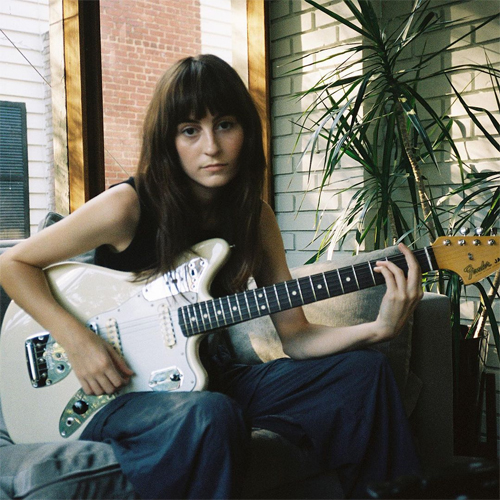
What were you using to record, guitar-wise? You mentioned your Harmony, but in the video it looks like you’re using a Fender Johnny Marr signature Jaguar…
"Yeah, that's mine, too. I usually only bring my Harmony to the studio because it's the only guitar I like to play, but Fender sent me that guitar over quarantine. I recorded my guitar part for Cheers after I got home because apparently I could not do it! I've never just done the chugging thing, and I was apparently really behind compared to the band. My homework was to record that at home.
"I also used a nylon-string guitar on the record a few times, which was new. It's a Harmony nylon that I got off Reverb. I just thought that, if I wrote on a nylon-string guitar, it would be a different outcome to writing on my Gibson or my Harmony, and I think it was.
"Then when we went to record it, they were like, 'This is such a shitty guitar.' They went and borrowed this super, super-nice nylon-string, which is like $2,000 from a music store, but I missed the shittiness of my nylon-string, and I made them switch it back out! It is a shitty guitar, but you could hear the shittiness…"
What do you look for in a guitar sound?
"Specifically for guitar, I really like just a clean, slightly reverb-y tone, but also my guitar has a crazy low-end. It's so bass-y, not by accident, but it's crazy. I feel like my Harmony matched with a Reverb Deluxe is just, like, 'it'. That's all I need.
I've never owned a pedal other than my tuner. I've never tried to put shit on my guitar; I just like this perfect clean combo. That has always been what I go for
"Like I said, I've never owned a pedal other than my tuner pedal. I've never tried to put shit on my guitar; I just like this perfect clean combo. That has always been what I go for."
This last year has caused many artists to reassess their priorities. What do you want from this record at this point?
"I don't know. I've been really focusing on self-growth. At the time, when I put out AMC, I was just like, 'This the best representation of me as a human being, ever.' And now I'm putting out this and I'm like, 'This is a little bit better than AMC,' you know? Not music-wise, but just in representing me. Like, if you listen to it, will you know me better off this than AMC? That's been really important to me. So, yeah, hopefully this this will be a new chapter. A new era."
- I Know I'm Funny haha is out tomorrow (June 25) via Secretly Canadian.

Matt is Deputy Editor for GuitarWorld.com. Before that he spent 10 years as a freelance music journalist, interviewing artists for the likes of Total Guitar, Guitarist, Guitar World, MusicRadar, NME.com, DJ Mag and Electronic Sound. In 2020, he launched CreativeMoney.co.uk, which aims to share the ideas that make creative lifestyles more sustainable. He plays guitar, but should not be allowed near your delay pedals.
“Such a rare piece”: Dave Navarro has chosen the guitar he’s using to record his first post-Jane’s Addiction material – and it’s a historic build
“The best guitar player I ever heard”: Nashville guitar extraordinaire Mac Gayden – who worked with Bob Dylan, Elvis, Linda Ronstadt and Simon & Garfunkel – dies at 83




![[from left] George Harrison with his Gretsch Country Gentleman, Norman Harris of Norman's Rare Guitars holds a gold-top Les Paul, John Fogerty with his legendary 1969 Rickenbacker](https://cdn.mos.cms.futurecdn.net/TuH3nuhn9etqjdn5sy4ntW.jpg)





